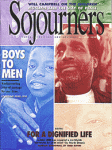"The prophets Isaiah and Ezekiel dined with me," says William Blake in The Marriage of Heaven and Hell, "and I asked how they dared so roundly to assert that God spoke to them."
While there is something rude about prophets from the cellar to the roof of their being, their worst social failing is that they talk about almost nothing but God, and—still worse—not the God of nice days and pleasant blessings, of infinite patience and automatic forgiveness, but the God of chastisements and catastrophes, of uncompromising demands and outraged love. These are not aspects of divinity that crowds of people are lining up to hear about.
It was Ezekiel's lot to live a double affliction. First he had to endure the siege and defeat of Jerusalem in 597 B.C.E. and to be among the exiles carrying with them nightmarish memories. Then, a captive in Babylonia, he was called to speak on the Creator's behalf and thus to suffer the usual fate of prophets: to be despised and ridiculed.
Yet it was not all loss. Ezekiel was given the rarest of favors. He saw the heavens open and was allowed to gaze on the seraphim, the cherubim, the throne of God—and on the throne "something that seemed like a human form." He was a prophet who not only heard but saw—and struggled to put what he saw into words. No other book of prophecies is so visual. Much of the iconography of Christianity has its foundation in Ezekiel's visions.
EZEKIEL'S WITNESS BEGINS with his first vision, and it is here that we are introduced to the prophet as poet: "Like a bow in the clouds on a rainy day, such was the splendor all around." (One of Dan Berrigan's early books of poems was The Bow in the Clouds, evidence that his newest book has been brewing for many years.)
Ezekiel and Berrigan have much in common. They are both poets, both God-afflicted men, both inclined to gestures that speak louder than words, both outraged with injustice, both uncompromising and plain spoken, both irritating, both overcome by sorrow and anger for the ways others in their country ignore divine commandments, abuse creation, hate their neighbor, and worship almost anything but God.
Berrigan's Ezekiel is like a maze of mirrors. The reader is given a tour of a prophetic text not by a biblical scholar but by another prophet. Thus Berrigan is not willing that we read Ezekiel with academic detachment, a document as safely removed from our lives as clay fragments found in an archaeological dig, but that we hear Ezekiel in the present tense and our present place. In the sins of the people of ancient Israel Berrigan sees the sins of today's America; the transgressions of the ancient synagogue are the crimes of today's Christianity.
Berrigan's literary method is to weave Ezekiel's text together with his own free-flowing commentary. The latter comes like a parade of featherweight boxers jabbing fiercely at a punching bag.
Side by side with the text there is a series of vivid images provided by Tom Lewis-Borbely, Berrigan's friend and (often enough) fellow prisoner: an urgent face shouting out truths we would rather not hear, brothers embracing with a love that costs dearly, the piercing gaze of Dorothy Day, the preaching hands of Martin Luther King, bombs falling, soldiers at war, the naked and the damned, light exploding at the heart of being.
Jim Forest was a Sojourners contributing editor and author, whose books include Praying With Icons (Orbis Books, 1997) and biographies of Dorothy Day and Thomas Merton, when this article appeared.
Ezekiel: Vision of the Beat. Daniel Berrigan. Orbis Books, 1997.

Got something to say about what you're reading? We value your feedback!